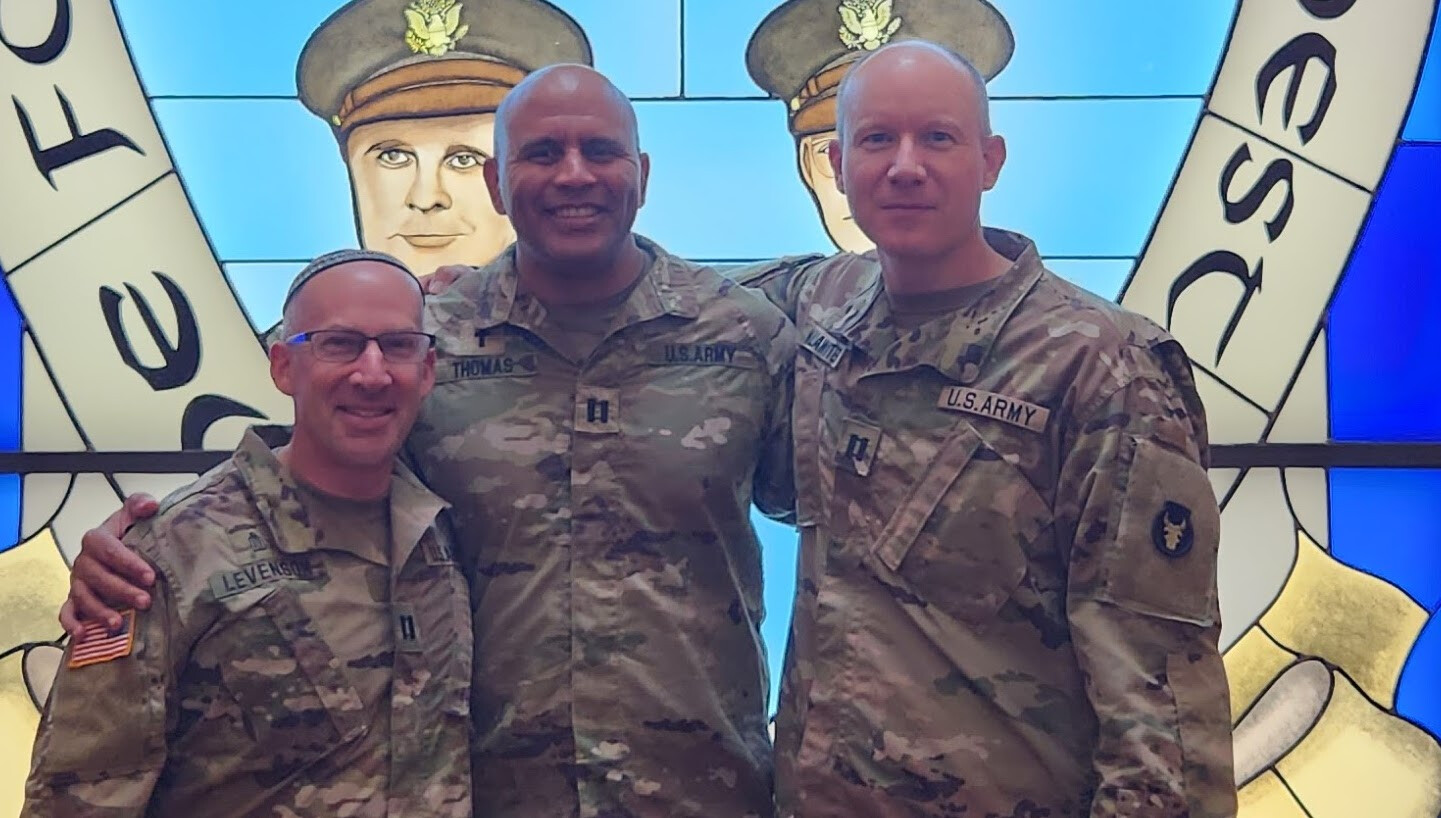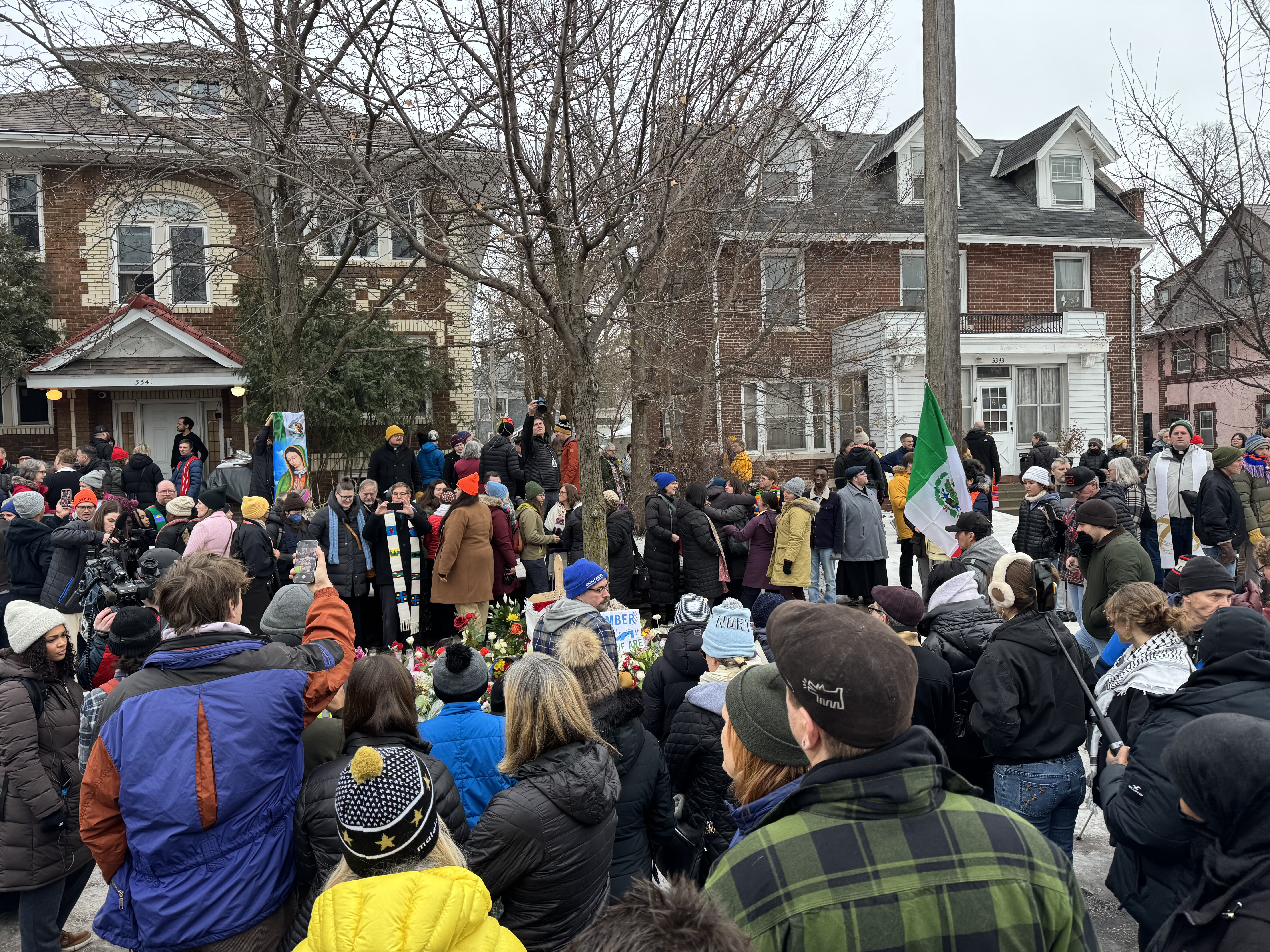From Pastor to Chaplain

This article originally appeared in the Forest Lake Times on October 6, 2023.
John Klawiter hit the peak of Table Top Mountain in North Carolina at an elevation of 3,425 feet in mid-August. It was an grueling 11-mile trail run, but one that came with a beautiful view. That trek he took with fellow army chaplain trainees was one of the final trail runs before Klawiter, who serves as the head pastor at Forest Lake’s Faith Lutheran Church, completed his chaplain basic training for the Minnesota Army National Guard on Friday, Aug. 18.
A little more than three years prior, his congregation had been considering a project, hoping to house homeless people, with a focus on homeless veterans. The project – an endeavor to use church land to build a tiny home site – was ultimately tabled after design plans and infrastructure needs were deemed unrealistic for the church’s space. The church instead supports similar endeavors around the area.
But something about helping veterans stuck with Klawiter. He had noticed the community’s support for veterans was something that “unites the community of Forest Lake,” he said. He grew curious and just wanted to know more about veterans and the military.
“I started poking around and asking some questions,” he said.
By then, Klawiter had begun to feel a pull to perhaps join the Minnesota Army National Guard as a chaplain and reached out to his uncle, who was a chaplain in Wisconsin. His uncle told him there was a unique need for “unrestricted” chaplains, who can offer support to a larger breadth of people in the military. Klawiter would be able to be one as a member of the clergy with the Evangelical Lutheran Church of America.
“That actually was the thing that pushed it over the top. … There’s going to be a need for my skill set and my background,” he said.
Training
In the fall of 2020, he was sworn in as a chaplain in the Minnesota Army National Guard and spent four weeks in chaplain basic training the following summer. Since then, he’s been traveling to Moorhead to train with a unit once a month, and then had two weeks a year with them. He had three years to complete the remaining nine weeks, and this summer, he took sabbatical from his position at Faith Lutheran to complete that training.
Just like any other military training, Klawiter had to get into prime physical condition.
The goal, physically, was to be able to keep up with soldiers.
“They don’t want chaplains to be the cog that slows down everything,” he said.
For the nine weeks this summer, he and his fellow chaplain trainees would work out from 5:30 to 7 a.m.
“Our course instructors were trying to push us physically to get better and better.”
And better he found himself, saying he “embraced” the physical training. Before the run up Table Top Mountain, he had run a 10K along the Atlantic Ocean in Charleston.
“That was part of the experience for me, too, [was] trying some of these adventures,” he said.
After those early morning workouts, he’d spend from 8:30 a.m. to 5 p.m. in classrooms learning about chaplaincy.
One big difference, Klawiter made sure to note, is that chaplains are non-combatants, which is a part of the Geneva Convention. Part of their training is actually about why chaplains aren’t allowed to shoot firearms, and the ethics of why that’s so.
Much of their training, as one would expect, is just how to provide religious support for soldiers and how to advise leadership of needs.
It wasn’t as much the physical training but the mental and spiritual training that Klawiter found challenging. He noted the mental fatigue from learning all about what to expect by being a chaplain in the army.
“A lot of the training involves ‘you don’t know what’s coming next’ and that’s a big piece of making sure I was mentally and spiritually ready for the unknown,” he said.
All of his training was marked by a capstone event, which was a field simulation as if he were deployed and had to give spiritual help.
His leaving for the summer was not without the support of the Faith Lutheran congregation.
“Since the beginning time where I said this was something I was going to do, I have only been met with support and encouragement, and if we spend our time in worship talking about service and sacrifice, they get it. They understand this is an extension of my call, and therefore it’s an extension of their call. They have not pushed back,” he said. Klawiter specifically noted his “great and capable leadership, not just on staff, but our congregation,” as part of that support.
“It’s a challenge, but they’re also not going to shy away from it. And they leaned into it,” he said. “They were so supportive this summer.”
But the hardest thing, he said, was leaving his family for the summer. He knew it would be a lot for his wife, Taryn, to handle parenting their eight children by herself this summer, including their son Oliver, who has special and medical needs.
“The hardest part was the guilt of being gone and knowing how hard it is to run the family, let alone like a big family like ours, let alone a family of special needs,” he said. But he added he also knew “how strong [Taryn] is,” saying “I wouldn’t have been able to do this without her and without her support.”
Chaplaincy
Because Klawiter had close to a decade as a pastor before he was sworn in, he is a direct-commissioned officer with a title of captain. Technically, he’s been a chaplain since then, but following the completion of his training, he is able to be deployed. Like all units with the Minnesota Army National Guard, he doesn’t know when deployment will happen or to where, but he’s not expected to deploy anytime soon – something Klawiter stressed – though he did mention some of his chaplain colleagues have been on deployments to Iraq or Djibouti, Africa. He’s currently with a unit called the 1347DSSB, based out of Bloomington, and trains with them one weekend a month, plus a two-week annual training.
There’s a lot, he said, that chaplains do, and they come from all types of faiths.
“Chaplains are coming from all over, and what we were learning is how do we provide religious support in a pluralistic environment in the Army,” he said.
One of his biggest roles is being a confidential resource to provide counseling so soldiers “don’t have to worry about repercussions,” he said; chaplains are also trained in suicide prevention.
His training has helped him learn how to provide religious support for all types of different faiths, though there are limits to what he can do. That could mean holding religious services in the Christian faith, but finding someone who could hold a religious service for another faith.
“In many respects, we’re providing religious support where we can and finding resources for other soldiers in need [of other religious support],” he said.
As a chaplain, he can help soldiers attain religious accommodations, such as dietary needs like kosher meals, or helping soldiers fasting during Ramadan with the scheduling of physical fitness testing.
“It’s not a great time for them to take the PT test because of that,” he said.
One of the biggest pieces he’s taken away from the summer, he said, was the value he gained from talking to those of different faiths from him.
“I’ve been able to find friendship across so many lines of different beliefs and different backgrounds,” he said. The one thing that kept coming back as a uniting theme, he said, was “service to their country.”
Back to civilian life
On that graduation day in August, Chaplain Klawiter was joined by seven of his children and Taryn in South Carolina.
“That was a pleasant surprise,” he said. Taryn hadn’t expected to join him, but at his request, she packed up the family in their van and drove cross-country, spending a couple of days in the Smoky Mountains before joining him for the big day.
“She drove down there and they were able to cheer me on, and I just — I was really just thankful they could be there,” he said. “I just can’t say enough about how she took it on, knowing how difficult it would be. The kids all worked together to help out and make it happen.”
Now Klawiter is getting back into the groove after a summer on this mission. He says he’s returning home with a different outlook on his job, with “more knowledge and confidence” not just as an Army chaplain, but “knowing a lot of those skills I developed are going to transfer back to the congregation — the counseling, leadership, and pastoral skills.”
He’s been keeping up with his physical workouts, including going on runs with his daughter — a rhythm he expects to continue, as she’s a cross-country runner. He’s still got his required training with his unit, but added his next mission is simply getting to know them, since they are a new unit for him.
Plus, he said: “I know there’s always more education. It’s weighing and balancing. … There’s always more that I could do.”
But he said he isn’t needing to rush that. For now, he’s glad to be back home and getting back into the swing of a new season.
“I’m so grateful I got to do it. It was a very rewarding summer, but it’s really nice to be done,” he said.





Login To Leave Comment